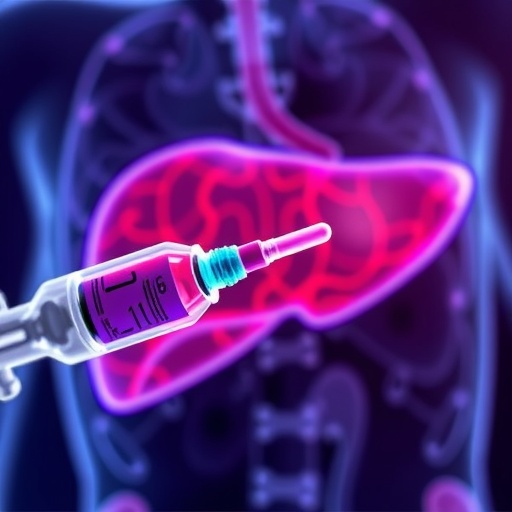
In a groundbreaking advancement for liver cancer treatment, researchers from the University of Birmingham have demonstrated that a novel dendritic cell (DC) vaccine, when combined with established chemoembolization therapy, significantly extends the time patients remain free from tumor progression. This pioneering study, funded by the National Institute for Health and Care Research (NIHR) and published in the esteemed journal Clinical Cancer Research, heralds an innovative immunotherapeutic approach targeting hepatocellular carcinoma (HCC), the most prevalent form of primary liver cancer.
Hepatocellular carcinoma ranks among the deadliest cancers globally, with limited effective therapeutic options, especially for those diagnosed at intermediate stages. The ImmunoTACE trial marks the first randomized, controlled clinical investigation evaluating a cell-based vaccine designed to potentiate the patient’s immune response against liver cancer. Uniquely, this therapeutic strategy involves harvesting dendritic cells from a patient’s own blood, expanding and loading them with tumor-specific antigens in vitro, and then reintroducing these activated cells to stimulate cytotoxic immune activity targeting the malignancy.
The randomized trial enrolled 48 patients with intermediate stage HCC, who were assigned to receive either the conventional treatment of transarterial chemoembolization (TACE) alone or combined with the dendritic cell vaccine. TACE, a localized chemotherapy technique that blocks tumor-associated blood vessels, has remained a standard care option, but its efficacy is often transient due to tumor adaptation and immune evasion. The addition of the DC vaccine appeared to substantially improve clinical outcomes: patients receiving the combined therapy exhibited a median progression-free survival of 18 months, compared to just 10 months in the control group treated with TACE alone.
Dendritic cells are a critical component of the adaptive immune system, serving as sentinels that capture and present antigens to T cells, thereby orchestrating targeted immune responses. However, in the context of cancer, naturally occurring dendritic cells frequently become dysfunctional or “exhausted,” trapped within the tumor microenvironment and unable to effectively prime immune killer cells. The vaccine developed by the Birmingham team circumvents this issue by expanding and energizing dendritic cells ex vivo using a cocktail of tumor-associated proteins. This precise antigenic loading enables the reawakened dendritic cells to robustly activate cytotoxic lymphocytes upon re-administration.
The manufacturing process entails isolating mononuclear white blood cells from the patients and culturing them under stringent laboratory conditions for eight days, during which dendritic cells mature and incorporate cancer-specific antigens. These antigens include multiple tumor proteins, broadening the immune system’s target range and reducing the likelihood of tumor immune escape through antigenic variation. Patients received the vaccine concurrently with their initial TACE treatment and then monthly for three subsequent doses, ensuring sustained immune activation.
Professor David Adams, the study’s chief investigator and Emeritus Professor of Hepatology, emphasized the significant implications of these results. “This is the first controlled clinical trial to provide evidence that a dendritic cell-based vaccine can improve outcomes for liver cancer patients,” he stated. “Given the high mortality associated with hepatocellular carcinoma, these findings offer a potential paradigm shift in how we approach immunotherapy for this challenging disease.”
Dr. Yuk Ting Ma, the lead author and Associate Clinical Professor at the University of Birmingham, further underscored the promise of this approach within the broader oncological landscape. The vaccine’s ability to provoke potent immune responses against multiple tumor antigens could complement existing immune checkpoint inhibitors, drugs that have transformed cancer therapy but often yield only modest benefits for HCC patients. Combining dendritic cell vaccination with checkpoint inhibition may synergistically enhance anti-tumor immunity, a hypothesis that future clinical trials will aim to test.
The ImmunoTACE trial stands out not only for its therapeutic innovation but also for its potential scalability and cost-effectiveness. By utilizing the patient’s own cells and a relatively short culture period, the generation of dendritic cell vaccines may become a viable adjunct to current liver cancer treatments without the extensive costs or complexities associated with other cell therapies like CAR-T cells.
Despite the promising outcomes, experts caution that larger phase 3 trials are essential to validate these findings, optimize dosing schedules, and assess long-term survival benefits. Moreover, investigating biomarkers predictive of response to dendritic cell vaccination could personalize treatment strategies, ensuring that patients most likely to benefit are identified early.
Hepatocellular carcinoma’s increasing incidence worldwide, including in the United Kingdom, underscores the urgent need for new, effective interventions. Traditional systemic therapies and locoregional treatments, while beneficial, have plateaued in their ability to extend meaningful survival. The advent of immunotherapeutics such as dendritic cell vaccines offers a new frontier, leveraging the immune system’s specificity and memory to achieve durable cancer control.
This study illuminates the complex interplay between tumor biology and immunity, demonstrating how restoring dendritic cell function within cancer patients can tip the balance in favor of the host. The ImmunoTACE trial exemplifies a precision medicine approach, tailoring therapy to the unique immunologic profile of each individual.
As research continues, the integration of cell-based vaccines with other immunomodulatory agents could redefine the therapeutic landscape of liver cancer, transforming a historically intractable disease into one increasingly manageable through harnessing the body’s own defenses.
Subject of Research: Cells
Article Title: Adding cell-based vaccine to liver cancer therapy slows cancer progression in patients with liver cancer
News Publication Date: 14-Aug-2025
Web References: DOI: 10.1158/1078-0432.CCR-25-0142
Keywords: Liver cancer, hepatocellular carcinoma, dendritic cell vaccine, immunotherapy, chemoembolization, cancer progression, clinical trial
Tags: cell-based vaccine for liver cancerchemoembolization therapydendritic cell vaccine therapyhepatocellular carcinoma treatmentimmuno-oncology advancementsimmunotherapy for liver cancerinnovative liver cancer therapiesNational Institute for Health and Care Research studypatient immune response enhancementpersonalized cancer treatment strategiesrandomized clinical trial in cancertumor progression in liver cancer





